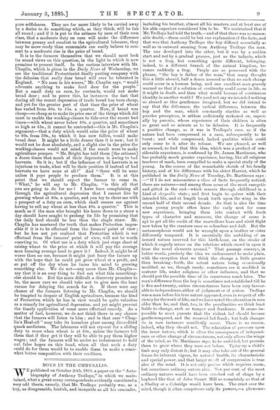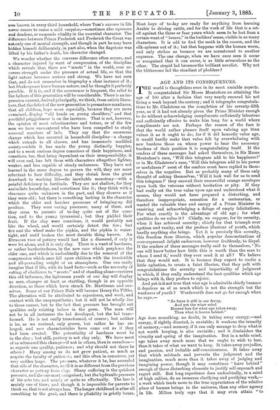BOYS IN THE CHRYSALIS.
WE published on October 20th,1383, a paper on the " Autobiography of Anthony Trollope," in which we maintained, what a great many correspondents evidently considered a very odd thesis, namely, that Mr. Trollope probably was, as a boy, as disagreeable, loutish, and incapable as all his comrades, including his brother, almost all his masters, and at least one of his able superiors considered him to be. We maintained that if Mr. Trollope had told the truth,—and of that there was no reasonable doubt,—there could be but one explanation of the facts, and that was that Anthony Trollope the boy differed essentially as well as iu outward seeming from Anthony Trollope the man. The one developed into the other, but it was by a sudden start and not by a gradual process, just as the tadpole, which is not a frog, but something quite different, belonging, indeed, to a different branch of the animal kingdom, becomes suddenly a frog. People are so possessed with the phrase, "the boy is father of the man," that many thought this a little absurd, half a dozen assured us that no such change could occur in a human being, and one excellent man gravely warned us that if a solution of continuity could occur in life, so it might in death, and then what would become of continuous identity in another world ? We need not say we intended nothing so absurd as this gentleman imagined, but we did intend to say that the difference, the radical difference, between the boy and the man, which constantly startles as well as puzzles preceptors, is seldom sufficiently reckoned on, especially by parents, whose experience of their children is often so great and so minute as to be delusive. It is frequently a positive change, as it was in Trollope's case, as if the nature had been compressed in a case, subsequently to be burst ; and while compressed, lacked qualities which could only come to it after its release. We are pleased, as well as amused, to find that this idea, which was a product of considerable experience, is confirmed by Dr. James Martineau, who has probably much greater experience, having, like all religions teachers of mark, been compelled to make a special study of the young. In the course of the remarkable sketch of his family history, and of his differences with his sister Harriet, which he published in the Daily News of Tuesday, Dr. Martineau says : —" If I do not misconstrue a class of facts frequently noticed, there are natures—and among them some of the most energetic and gifted in the end—which remain through childhood in a kind of chrysalis state; and first begin to quiver with their intended life, and at length break forth upon the wing in the second half of their second decade. As that is also the time when young people often leave the early nest for some new experience, bringing them into contact with fresh types of character and manners, the change of scene is apt to get all the credit of the marvellous hues and vivid flight now taken by the creature once so colourless and dull. But the metamorphosis would not be wrought upon a brother or sister differently tempered. It is essentially the unfolding of an inward nature reserved for this birth-hour, on the stroke of which it eagerly seizes on the relations which crowd in upon it from the novel elements around." That passage conveys, in better words, precisely the idea we endeavoured to make plain, with the exception that we think the change a little greater than breaking forth, the actual nature being occasionally modified, as we, though rarely, sometimes see it modified in maturer life, under religious or other influence, and that we should put the possible time of its occurrence much later. The man's difference from the boy is sometimes not established till he is five-and-twenty, unless circumstances have been very favourable to independence, either of judgment or of action. Trollope was a man before his true nature appeared, even in respect of efficiency for the work of life; and we have noted the alteration in men older than he, and that, too, in the peculiarities we think least liable to change, such as temper and frankness. It seems impossible to most parents that the violent lad should become gentle-tempered, and the reserved lad frank ; but both changes do in rare instances manifestly occur. There is no reason, indeed, why they should not. The relaxation of pressure upon the inner nature, which is often the consequence of independence or other change of circumstances, not only allows the wings of the mind, as Dr. Martineau says, to be unfolded, but permits them to grow where they were not before. Tying-up a child's limb may only distort it ; but it may also take out of the general frame its inherent vigour, its natural health, its characteristic and special power, and that larger re❑it of compression is true also of the mind. It is not only genius which requires room, but sometimes ordinary nature also. Ten per cent. of the most ordinary natures would have been crushed out of shape by a boyhood like that of John Stuart Mill as completely as that of a Shelley or a Coleridge would have been. The crust over the mind, though it often compresses only its powers,—a phenome
non known in every third household, where Tom's success in life never ceases to cause a mild surprise,—sometimes also squeezes and deadens, or suspends vitality in the essential character. The difference between Prince Frederick and Frederick the Great was notonly one of mental strength, and though in part he may have hidden himself deliberately, in part also, when the flagstone was lifted by his father's death, his character changed.
We wonder whether the converse difference often occurs, and a character injured by want of compression, of the discipline which reveals that there are " musts " in the world, ever recovers strength under the pressure of actual life, so that the light nature becomes serious and strong. We have not seen that, and do not remember in biography a clear instance of it ; but Shakespeare knew human nature, and he thought it perfectly possible. If it is, and if the occurrence is frequent, the relief to the fathers of this generation will be considerable. There is an impression current, derived principally, we think, from satiric literature, that the defect of the new generation is premature manliness, that all children, boys more especially, because they are more examined, display "old heads on young shoulders," and that youthful priggishness is on the increase. That is not, however, the opinion of most schoolmasters and tutors, or of the few men we have encountered who have been compelled to study unusual numbers of lads. They say that the enormous change which has occurred in household discipline—a change which extends to all classes, and has immensely modified society—while it has made the young distinctly happier, and to a most curious degree conscious of their happiness, and conscious, too, that being dependent on their irresponsibility, it will soon end, has left them with characters altogether lighter, weaker, and less capable of steady endurance. They have not learned in the same degree to govern the will, they are more reluctant to face difficulty, and they shrink from the great drawback to working life—its inevitable monotony—with a painful deficiency in fortitude. They are not shallow, for they assimilate knowledge, and sometimes like it; they think with a clearness quite unknown in the past, and they observe as if they were old ; but there is something lacking in the character which the older and harsher processes of bringing-up did produce. They were vexing processes, many of them, and they seem to parents of to-day quite out of the question, and to the young tyrannical ; but they yielded their fruit. If the clay were conscious, it would probably not like the wheel, and would certainly detest the fire ; but fire and the wheel make the pipkin, and the pipkin is watertight, and until broken the most durable thing known. An Etruscan vase of pottery would last like a diamond, if only it were let alone, and it is only clay. There is a want of hardness, or rather hardsettedness, in the new race which perplexes the elder one, and which is undoubtedly due to the removal of the compression which once fell upon children with the irresistible and all-pervading weight of an atmosphere. One can easily imagine that if life, with its hard facts—such as the necessity of eating, of obedience to " musts," and of standing alone—restores this old influence, the lightsome youth of our day will display as men, changes at least as startling, though in an opposite direction, as those which have struck Dr. Martineau and ourselves. Some of our Prince Hals will become Henry the Fifths. The alteration will be attributed to experience, and work, and contact with the unsympathetic; but it will not be wholly due to those causes, but to the fact that pressure has brought out qualities only existing before in the germ. The man will not be in all instances the lad developed, but the lad transformed. He is not really transformed, of coarse ; but neither is he, as we contend, only grown, but rather he has enlarged, and new characteristics have come out as if they had been created. The potentiality of hardness must be in the clay ; but still, pottery is not clay only. We have most of us witnessed this change—if not in others, then in ourselves— as regards one quality, patience ; and why should not there be others ? Many among us do not grow patient, so much as acquire the faculty of patience ; and this often in conscious, yet very sudden leaps. The pressure, whatever it be, has annealed that side of the character, until it is as different from the previous character as pottery from clay. Sharp suffering is the quickest pressure, and the one most recognised; but the hydraulic pressure of life acts too, and nearly or quite as effectually. The loss is mainly one of time; and though it is impossible for parents to think so, that is not always loss. The longer childhood is after all something to the good, and there is pliability in gristly bones.
Most boys of to-day are ready for anything from learning Arabic to driving cattle, and for the work of life that is a setoff against the three or four years which seem to be lost from a certain want of " breeze," in the builders' sense, visible in so many characters. It is odd to find the moth in the cocoon, and the silk-spinner out of it ; but that happens with the human worm, and only strikes us because we are accustomed to another sequence. The one change, when we have once seen it occur or recognised that it can occur, is as little miraculous as the other. The stupid lad becomes the brilliant novelist. Why not the blithesome lad the steadiest of plodders ?











































 Previous page
Previous page